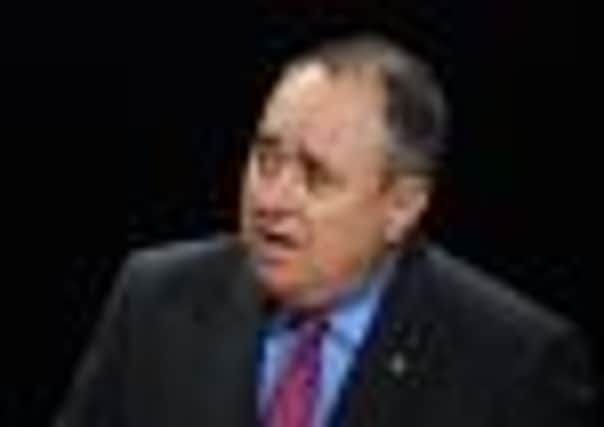Ian Swanson: Nato vote shakes foundation of formerly united SNP front


Alex Salmond and his colleagues were on a high as they left Perth on Sunday at the end of the SNP conference.
They had celebrated the newly-signed Edinburgh Agreement which allows the independence referendum to go ahead. The potentially divisive Nato debate had seen rousing speeches and a close vote, with the result going the leadership’s way. And to top it all, a new poll showed a majority of Scots would back independence if they thought the Tories were going to win the next UK election.
Advertisement
Hide AdAdvertisement
Hide AdBut less than 48 hours later, the First Minister and his party were experiencing their worst day since coming to power five and a half years ago.
Two MSPs took everyone by surprise by announcing their resignation over the conference decision that an independent Scotland should be a member of Nato. Jean Urquhart and John Finnie are both well-respected politicians who quit on a matter of principle, which makes it a bigger blow. Mr Salmond said he was saddened by their decision, but insiders say furious would have been a better description.
And later, Mr Salmond found himself labelled a “bare-faced liar” when Nicola Sturgeon revealed the Scottish Government had not sought legal advice over an independent Scotland’s membership of the European Union, despite the First Minister apparently saying in a TV interview that it had.
The sudden and unforeseen reversal of fortune shows just how quickly political luck can change.
And it should perhaps serve as a warning to the SNP that not everything can be massaged to suit its purposes.
Defence spokesman Angus Robertson and others arguing in favour of the change of policy on Nato made no bones about the fact the move was driven by a need to bring the party into line with public opinion ahead of the referendum. Speaker after speaker cited a survey showing 75 per cent of people felt an independent Scotland should be in Nato.
Mr Robertson emphasised that Nato membership would depend on the removal of Trident nuclear weapons from the Clyde – a condition which critics say Nato would never accept.
But delegates who wanted to stick to the SNP’s previous policy of pulling out of Nato claimed it was hypocritical to argue Scotland should get rid of nuclear weapons and then seek to be part of a first-strike nuclear alliance.
Advertisement
Hide AdAdvertisement
Hide AdAfter the vote – which saw the anti-Nato policy thrown out by just 29 votes – there were reports of some on the losing side tearing up their party cards. But the party congratulated itself on the mature debate, the passionate speeches and its open democratic process.
The resignations came as a shock, but arguably the party should have been more attentive to the strength of feeling on the issue.
The two MSPs, who will now sit as independents, have made it clear they will continue to campaign for independence and support the government, so Mr Salmond need not worry about being defeated in the chamber.
But the near disappearance of his majority in the parliament – he now has 65 of the 129 MSPs – takes the shine off last year’s unprecedented triumph when the SNP stormed to victory with more seats than all the other parties put together – an achievement which everyone said was virtually impossible under the proportional voting system for Holyrood.
And the row over the legal advice on EU membership is also damaging. Attempts by Mr Salmond and Ms Sturgeon to deny he meant what everyone took him to mean undermine the government’s credibility. And the fact they spent thousands of pounds on a court challenge to the Information Commissioner over her ruling on the issue only adds to the problem.
Another potentially damaging row over the long delay in publishing the results of the consultations on the independence referendum was defused when the responses showed a majority in favour of a single question, which is what the government had already signed up to.
Up until now, the SNP group has been remarkable for its unity and loyalty – mainly due to an unwillingness to endanger the prize of independence – while Mr Salmond and his team have made it their mission to prove the SNP’s credibility and competence in office.
Government will continue, but all these virtues now have a question mark over them which was not there before.
Independents on the rise
Advertisement
Hide AdAdvertisement
Hide AdTHE decision of MSPs Jean Urquhart and John Finnie to quit the SNP and sit as independents opens up the possibility of a new grouping at Holyrood with a direct influence on the parliament’s agenda.
If independent Lothians MSP Margo MacDonald and the two Greens were to link up with the two new independent MSPs they would have the five members needed to get a seat on the business bureau, where party managers meet in private to decide what issues should be debated. They would not need to have an agreed set of policies, but by forming a loose grouping they could gain a voice at a high level inside the parliament.
A similar arrangement in the second parliament brought together independents Ms MacDonald and Denis Canavan, hospital campaigner Jean Turner, pensioners champion John Swinburne and SNP defector Campbell Martin.